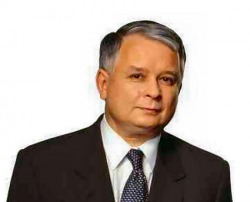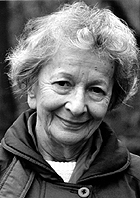I finally had a chance to digest the poems in Wislawa Szymborska’s latest collection, “Here,” published last month by Houghton Mifflin Harcourt. If you are unfamiliar with Ms. Szymborska’s Nobel Prize winning poetry, she is the queen of depth, master of juxtaposition, and standard-bearer of profundity encapsulated in simplicity. Ms. Szymborska’s previous release, titled “Poems; New and Collected,” contained a variety of thought provoking works from a world of themes, of which I selected a number of poems to adapt into a pop music album (Click here for samples!) The new collection is no different, with subject matters ranging from memory and Ella Fitzgerald, to the art of writing poems and well known works of art. “Here” also shares the same translators, Clare Cavanagh and Stanislaw Baranczak, who have proven time and again that the essence and brevity of Szymborska can be realized perfectly in English.
I found two extraordinary examples of the depth and perspective that underlines “Here.” The first is a poem entitled “Teenager.” In it, the subject addresses herself as a youth, with her entire life ahead of her. They share similarities, but mainly the subject expands on their differences. She compares basic qualities like their stature and skin, and then more interesting is their perception of time. For the youth, “time is still cheap and unsteady,” while for the elderly woman, “it’s far more precious and precise.” Ms. Szymborska often leaves us with a final line to contemplate on, and this poem is no exception.
In “Absence,” there is even more to think about as Ms. Szymborska delves into the idea of what would happen had her mother and father married different people. She wonders what their separate offspring would be like. We often think of the fact that we would not be here in those instances, and, perhaps in our egocentricities, we do not think much about what those children would be like, and how they would share some of our attributes. The subject mentions that each child has some of her characteristics, but “she wouldn’t have been me.” Szymborska relates some of the things that this fictitious person is probably better at than herself. She even wonders what would happen if these two girls had met one another.
“Here” offers us more of the expansive and evocative art that we have come to expect from Szymborska. Her tongue in cheek wit and focused moments of grandeur remind us that like a fine wine, her craft only matures with age.
I found two extraordinary examples of the depth and perspective that underlines “Here.” The first is a poem entitled “Teenager.” In it, the subject addresses herself as a youth, with her entire life ahead of her. They share similarities, but mainly the subject expands on their differences. She compares basic qualities like their stature and skin, and then more interesting is their perception of time. For the youth, “time is still cheap and unsteady,” while for the elderly woman, “it’s far more precious and precise.” Ms. Szymborska often leaves us with a final line to contemplate on, and this poem is no exception.
In “Absence,” there is even more to think about as Ms. Szymborska delves into the idea of what would happen had her mother and father married different people. She wonders what their separate offspring would be like. We often think of the fact that we would not be here in those instances, and, perhaps in our egocentricities, we do not think much about what those children would be like, and how they would share some of our attributes. The subject mentions that each child has some of her characteristics, but “she wouldn’t have been me.” Szymborska relates some of the things that this fictitious person is probably better at than herself. She even wonders what would happen if these two girls had met one another.
“Here” offers us more of the expansive and evocative art that we have come to expect from Szymborska. Her tongue in cheek wit and focused moments of grandeur remind us that like a fine wine, her craft only matures with age.


 RSS Feed
RSS Feed